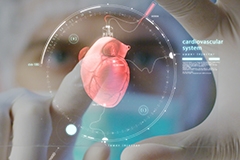Heart Treatment Advances Improve Patients’ Lives
Medically Reviewed by Alan M. Blaker, MD
Between 1970 and 2010, fatalities due to heart problems dramatically dropped – thanks to a focus on smoking cessation, cholesterol reduction and blood pressure control. Unfortunately, now – due to obesity and an aging population – the heart death rates are no longer falling and starting to increase.
“Thanks to continuing breakthroughs in pharmaceutical and device research, today’s heart patients have more treatment possibilities than ever,” says McLeod Cardiologist Dr. Alan Blaker. “Most of these improvements are relatively recent. Until the last decade of the 20th century, heart failure treatment emphasized salt restrictions, decreasing fluid build up through diuretic drugs and limiting activities that made a patient short of breath.”
MEDICATIONS
Since the early 21st century, medications helped reduce death from heart failure by up to 40 percent a year and improve a patient’s life.
- Statins reduce the bad cholesterol (LDL) in the blood, minimizing blockage of the arteries and inflammation of the blood vessels that can lead to heart failure, heart attacks or stroke.
- Antihypertensive medication helps control blood pressure and reduce stress on the heart. These medications include ACE inhibitors (Lisinopril, Captopril), Beta blockers (metoprolol), calcium-channel blockers and ARBs (angiotensin-receptor blockers).
- New CHF medications like Entresto (valsartan/sacubitril) for systolic heart failure helps patients live longer and reduce the risk of hospitalization for recurrent CHF.
DEVICES
Pacemakers have been around for half a century and help stabilize a heart that beats too slowly. Starting out about the size of a 50-cent piece, now they can be as small as a vitamin capsule. Implantable cardiac defibrillators (ICDs) include a pacemaker function but can also use electric jolts to stabilize erratic hearts in patients at increased risk for dying suddenly. Wearable vest defibrillators are available to use for some patients who are not yet ready for an implanted device. Ventricular Assist Devices (VADs) help the heart pump oxygenated blood to the rest of the body. Many of the models can now be accessed remotely through a patient’s phone to determine if the patient needs to see their cardiologist.
Advances in heart-related medical devices mirrored the pace of breakthrough developments in consumer and auto electronics. Newer pacemakers and ICDs can monitor the body’s temperature, hormone levels, adrenaline, oxygen levels and even physical activity.
PROCEDURES
Cardiac Catheterization helped diagnose the state of a heart problem. Cardiologists enter through an artery in the leg but, more recently, are entering from an artery on the wrist, leading to faster recovery and less chance of bruising or bleeding.
The Coronary Artery Bypass Graft (CABG) was one of the first major breakthroughs for people with clogged heart arteries. The cardiac surgeon takes a vein from the leg and bypasses the clogged heart artery. Standard procedures require stopping the heart and hooking the patient up to a heart-lung machine during surgery. A few surgeons have even accomplished performing the bypass procedure while the heart continues to beat.
Then, cardiologists learned they could insert a stent (small pipe) inside the clogged artery to open it up. These were improved by coating the stent with drugs that helps prevent it from clogging back-up with plaque.
Surgery can be used to repair or replace the valves in the heart to control the direction and flow of blood. Transcatheter Aortic Valve Replacement/Implantation (TAVR or TAVI) is a minimally invasive procedure, which does NOT require open-heart surgery. Using a thin tube (catheter) inserted through a blood vessel into the heart, a compact replacement valve is positioned and expanded in place.
Today, many heart surgeries that previously required the surgeon to open the chest and crack some ribs to gain access are now performed with a few small incisions. As robotically-assisted surgeries of many types are increasing, those related to the heart are being introduced.
LOOKING FORWARD
Next strides will include targeted therapies based on a person’s genetics, stem cell growth to replace injured heart cells and greater emphasis on weight reduction and risk factor modification.
Sources include: McLeod Health, Journal of the American Medical Association, American Heart Association, Helath Affairs, World Heart Federation
-
McLEOD REGIONAL MEDICAL CENTER FLORENCE
843-777-2000 -
McLEOD DARLINGTON
843-777-1100 -
McLEOD DILLON
843-774-4111 -
McLEOD LORIS
843-716-7000 -
McLEOD SEACOAST
843-390-8100 -
McLEOD CHERAW
843-537-7881 -
McLEOD CLARENDON
803-433-3000



-
McLEOD REGIONAL MEDICAL CENTER FLORENCE
843-777-2000 -
McLEOD DARLINGTON
843-777-1100 -
McLEOD DILLON
843-774-4111 -
McLEOD LORIS
843-716-7000 -
McLEOD SEACOAST
843-390-8100 -
McLEOD CHERAW
843-537-7881 -
McLEOD CLARENDON
803-433-3000
 Find a Doctor
Find a Doctor  Locations
Locations  Services
Services 